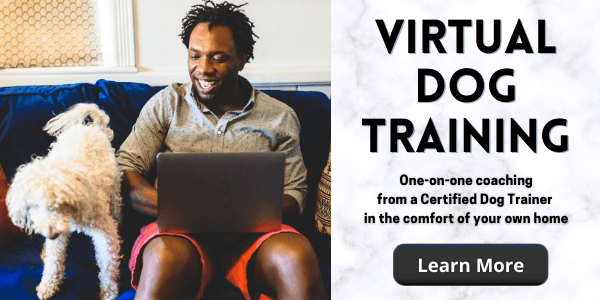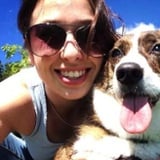 Shredded shoes. Chewed-up table legs. Pillows de-stuffed. A dog can quickly destroy quite a few things throughout your home with their chewing talents. I've seen dogs chew through harnesses or tethers in under a minute and worked with dogs who have chewed holes through walls during separation anxiety panic attacks.
Shredded shoes. Chewed-up table legs. Pillows de-stuffed. A dog can quickly destroy quite a few things throughout your home with their chewing talents. I've seen dogs chew through harnesses or tethers in under a minute and worked with dogs who have chewed holes through walls during separation anxiety panic attacks.
Not only is a dog's excessive chewing frustrating, but it can be expensive to replace household items. Plus, it can be dangerous for your dog if they chew on toxic or dangerous things like power cords or remote controllers with batteries.
Shoes, glasses, and other clothing are also common chewing casualties. Dogs gravitate towards things that smell, so the things we sweat in or on are extra enticing to them. Plus, shoes and slippers are made from materials that mimic dog toys and are simply fun for your dog to shred.
If you're tired of replacing items around your home that your dog has chewed on or worried about keeping them safe, there are ways to stop your dog's chewing. First, it's important to understand why your dog is chewing, so that you can address the underlying problem. Treat the cause of the behavior, not just the symptoms!
Table of Contents
Why is Your Dog Chewing Everything?
Your Dog NEEDS to Chew
Chewing is an important activity for dogs for a variety of reasons. It keeps their jaws strong, plays a role in keeping their teeth clean, and due to its repetitive nature, it's naturally calming. The act of chewing produces "feel good" chemicals in your dog's brain, such as dopamine, serotonin, and endorphins.
Your dog will always have an instinctual need to chew — you can't train it out of them. But you can do things to make sure they are chewing on appropriate dog chews or toys instead of your shoes.
Dog Chewing Due to Boredom
If a dog isn't getting enough physical exercise or mental enrichment, they'll find something to do to entertain themselves. This often means they'll start chewing on whatever is available, whether it's your table or your shoes.
Even if you leave lots of dog toys out for your dog, these easily lose their "value" and aren't as exciting as when they were brand new. So it's not just about throwing all of your dog's toys on the floor in hopes that they'll not chew on your furniture.
Dog Chewing Due to Stress or Anxiety
Dogs who experience anxiety when left alone (separation anxiety) or suffer from other anxieties (like noise anxiety), may exhibit excessive destructive chewing. Dogs with separation anxiety may even try chewing through walls or doors in an effort to get to their person.
Destructive chewing due to stress or anxiety is not your dog throwing a tantrum or trying to teach you a lesson. They are having a panic attack, and chewing is just a symptom of their panic. In cases of less apparent stress, such as when you have house guests and your dog isn't so sure about all the activity, they may start to chew to try and calm themselves down.
If your dog is only chewing on things when they are left alone or during other stressful events, it's best to treat that underlying anxiety rather than focusing on just stopping the chewing.
Dog Chewing Due to Teething
During teething, when your puppy is losing their puppy teeth, and their adult teeth are growing in, chewing helps soothe the pain and sore gums. Providing special teething chews can go a long way in helping them feel better. Puppies start teething usually between 12 to 16 weeks of age, and it lasts until 6 to 7 months old.
Beyond destructive chewing, teething puppies also tend to get extra nippy and mouthy. See my top tips for nipping puppies here.
At What Age Do Puppies Stop Chewing?
Your dog won't simply grow out of chewing. If you don't help them learn what's okay to chew on and what isn't from a young age, they'll have a habit of making any and everything a chew toy. Puppies will often chew more than adult dogs because of their teething, which will lessen when teething ends around 7 months old.
But adult dogs will still need to chew! If you're consistent in teaching your puppy what's okay to put their mouth on and making sure they have access to their preferred chews, as an adult they will make better choices in their chewing habits.
How to Stop Your Dog's Inappropriate Chewing
Manage Your Dog's Environment
 The number one thing you can do to stop your dog's destructive chewing is to remove the temptation! This is especially important for puppies who are learning what they should and should not put their mouths on. Don't give your puppy the chance to chew on items you don't want them to chew on.
The number one thing you can do to stop your dog's destructive chewing is to remove the temptation! This is especially important for puppies who are learning what they should and should not put their mouths on. Don't give your puppy the chance to chew on items you don't want them to chew on.
- "Puppy proof" every room your dog has access to.
- Block off access to rooms that have enticing items your dog may want to chew on. For example, I have an auto-close baby gate installed in my stepson's bedroom doorway, as my younger dog is incredibly interested in his legos and other toys. It was much easier to set up a gate than to expect a 10-year-old child to keep his floor picked up, or the door always closed.
- Supervise your puppy to calmly interrupt inappropriate chewing and redirect them to appropriate chews. See below for my favorite options.
- Set up a puppy playpen where your puppy can hang out safely when not under direct supervision.
- Keep your shoes and jackets put away, hang up your backpacks or purses, and store other items up high out of your dog's reach. This removes the opportunity but also helps prevent xylitol poisoning, ingesting things that cause intestinal blockages, or suffocation tragedies.
Vet Tip: Regularly check your dog's poo for any "contraband" like legos or Nerf gun ammunition. This helps you determine whether your dog is chewing on and ingesting household items and can also be an early indicator of a risk of an intestinal blockage if none or only part of the ingested item is "passed."
Give Your Dog Appropriate Things to Chew
Make sure your dog always has access to between 3 to 5 chew toys. Test out what type of toys your dog most enjoys. Some like soft stuffies, while others like harder rubber, rope toys, squeakers, or crinkly toys. My younger dog prefers harder rubber toys to gnaw on, while my older girl likes to nibble on stuffed dog toys.
Wondering what toys your dog might like? Learn about the different "chewsonalities" here to find out what are the safest chew toy options. Puppies and senior dogs often need softer chew toy material, as their teeth can be more sensitive.
Edible Dog Chews & Puzzle Feeders
My favorite way to ensure my dogs are getting enough appropriate chewing every day is to provide them with daily edible chews. I give my dogs Virbac C.E.T. dental chews to get the extra benefit of dental care, and then rotate in Earth Animal No-Hide Chews for variety. More of my top picks for edible dog chews here.
Note: Always supervise your dog when they have edible chews.
Another way to reduce the chances your dog will seek out inappropriate things to chew on is to provide regular meals via enrichment toys. Enrichment helps decrease boredom and channels excess energy into better options than destructive chewing.
Mealtime is the easiest option to make into a brain game. Instead of just snarfing up all the food from a regular bowl, slow down your dog's eating with an interactive feeder. Snuffle mats are perfect for getting your dog to sniff for their meals, and West Paw Toppls are my favorite stuffable toy to encourage licking – both of which are decompression activities for dogs.
Check out more of my favorite interactive feeders and dog puzzles here. Here's a photo of just some of my dogs' interactive feeder and puzzle stash – there is a lot to choose from, and variety is the spice of life!

Rotate Your Dog's Toys and Chews
Many people tell me, "My dog has plenty of toys out, and yet they still chew up my stuff!" What gives? Well, first, we want to rule out things like separation anxiety or stress as the underlying cause of destructive chewing. But often, this happens because a dog has simply gotten bored with the same-old, same-old toys.
To keep your dog interested in appropriate chew toys, rotate which toys are out each week. As I mentioned above, you want to have around 3 to 5 different chew toys available for your dog. Keep other toys put away in a closet and then rotate through them. This way, you don't have to buy brand-new toys all the time, but your dog still gets "new" toys to keep it exciting. Make a big deal about the toys when they come out of hiding to increase the value of them for your dog.
Toy rotation makes it easier to remember to clean your dog's toys regularly!
Does Bitter Apple Spray Work?
"No-chew" sprays are simply deterrents; they aren't a solution for a dog's destructive chewing. And in my experience, many dogs actually don't seem to mind the taste and will chew on things even after they've been treated with bitter apple spray. The spray will also dissipate with time, leaving the item free and clear for chewing in the future. I tend to only recommend bitter sprays in extreme cases where other more effective and safer management is not possible (which is rare), and never as the only part of treatment.
What Should You Do if You Catch Your Dog Chewing on Things?
It can be frustrating to find your dog chewing on something they shouldn't be, but don't let that frustration come out in yelling, screaming, or hitting. Doing so damages your relationship with your dog and doesn't do anything to stop future chewing. And in many cases, it causes avoidant behavior in your dog where they try to hide from you. Your dog doesn't "know better." They're simply being a dog, and dogs need to chew.
Instead, calmly ask your dog to Drop It or do a trade for the item. Staying calm and positive while you do this helps prevent your dog from playing "keep away" or starting to resource guard.
Then consider how you can prevent your dog from doing it again. Do you need to block off access to that room? Be more careful about leaving something very enticing out within easy reach. Meet your dog's needs to prevent boredom chewing. Or get help from a certified behavior consultant to treat your dog's anxiety? Identifying the underlying issue for your dog's chewing will go a long way in stopping it in the future.
Looking for help with your dog's destructive chewing? I can help!
Connect with me in a virtual one-on-one session to get the chewing under control.



